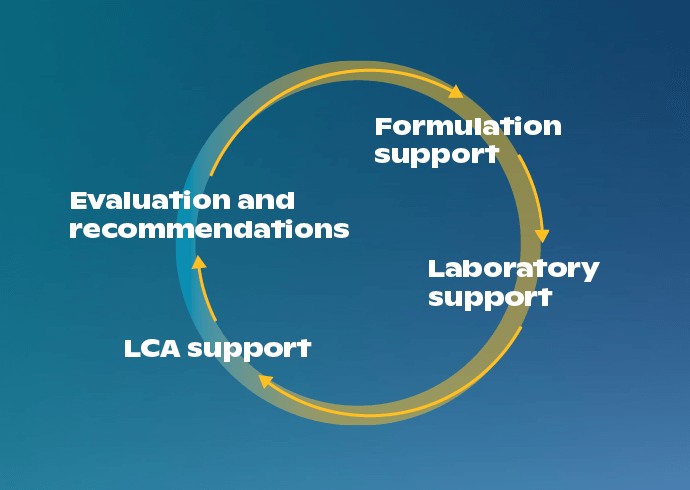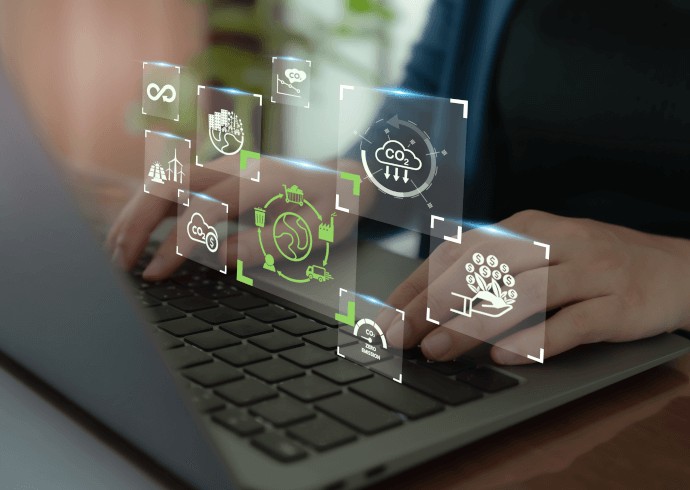Sustainability Services

We support your sustainability transition.
Life Cycle Assessment
What is a Life Cycle Assessment?
What is the difference between Life Cycle Assessment, Product Carbon Footprint, and Environmental Product Declarations?
What is the Quick Scan LCA?
- Goal and Scope: Most products’ impact is associated with their raw material use. Our Quick Scan creates insight into this impact by analyzing the effects of your raw materials on the environment.
- Environmental Impact Evaluation: Using advanced software and LCA databases, we calculate the environmental impacts in categories such as global warming potential (CO2 footprint), resource depletion, and water usage.
- Reporting: You will receive a compact report in 10 working days after delivering the necessary data to KRAHN, detailing the findings of the Quick Scan LCA, and opportunities for improvement.
Our Quick Scan LCA isn’t just a report; it’s the beginning of a journey toward a more sustainable business. Whenever possible, we’ll provide suggestions to help you implement changes that will support you in reducing your product’s impact.
What are the uses of a Life Cycle Assessment?
Life Cycle Assessment (LCA) allows you to understand & improve your products’ environmental impact, as well as communicate transparently about the impact of your products – to customers, business partners and other stakeholders. As such, LCA is a versatile tool that can be used for a number of reasons:
- Eco-design: LCA supports you in internal knowledge and decision making. By learning where your environmental impact comes from (raw materials, production, waste, …), you can then effectively reduce this impact and optimize your processes.
- Meeting regulatory requirements: LCA helps you deal with environmental policy regulations and requirements, including the EU Green Deal. Doing LCA will enable to set the appropriate course at an early stage.
- Communication: The assessment lets you communicate correctly & transparently about your products environmental impact (both B2B and B2C context), according to (new) regulations. For example, through third-party verified LCA and EPD reports, complying with ISO14040/14044, ISO14025, and optionally following the Product Environmental Footprint (PEF) principles.
How is a Life Cycle Assessment conducted?
Why KRAHN Chemie?
We are your trusted partner, offering technical and application expertise to support your goals. Expanding this support to include new dimensions – such as sustainability – is a natural next step for us.
With us you will receive:
- PCF reports according to ISO 14067 & GHG Protocol
- LCA reports according to ISO 14040/44
- Development of EPDs according to ISO 14025
- Data transparency
- Exclusive data access
- Post-project support
- Potential optimization recommendations
- Provide/find raw materials that improve the LCA results
Sustainability Workshops
In a one-day KRAHN Chemie sustainability workshop, we would like to sensitize you to these requirements: Individually adapted to your and your customers’ needs, we create a podium for you and your colleagues to identify the opportunities and potential threats that the various sustainability topics could entail for your company.
What exactly is a sustainability workshop?
What are the benefits of a sustainability workshop?
What content is on the agenda?
Why KRAHN Chemie?
With us you will receive:
- Deep knowledge of the topics, accompanied with technical literacy, which enables KRAHN Chemie to provide you with in-depth information customized to your needs
- As a stakeholder close to both the producer and the customer, KRAHN Chemie is able to bring together valuable market intelligence and share it with our trusted partners
- We did the sustainability training for ourselves and conducted it successfully with all our employees. We believe in partnerships across the supply chain, which form strong bonds and enable an aligned approach towards the future challenges
Recycling
What are the benefits of recycling?
Recycling has great environmental advantages, but can also help your business in terms of efficiency and cost savings:
- Resource conservation: Recycling reduces the need for raw materials extraction, conserving natural resources and minimizing environmental impact associated with mining and processing – while also helping businesses mitigate supply chain risks and reduce material costs.
- Energy savings: Recycling often requires less energy than producing new materials from scratch, contributing to lower greenhouse gas emissions, lower overall energy consumption leading to reduced energy costs.
- Waste reduction: Proper recycling decreases the volume of waste sent to landfills or incinerators, cutting disposal costs, supporting sustainable waste management practices and reducing environmental pollution.
What can we support you with?
What does the process look like?
Our process is designed to get the most out of your production waste:
- We analyze and map your waste streams based on volume, type, composition and other key characteristics to identify the most efficient recycling solutions.
- We do a proof of concept of recycling in our in-house laboratories to determine the most effective techniques for your specific waste stream.
- We take care of finding the right partners for you to scale up your recycling process.
- We conduct an economic and environmental evaluation of the recycled product to ensure it is cost-competitive with virgin materials and offers a lower environmental impact.
Why KRAHN Chemie?
We offer:
- A combination of technical expertise and sustainability know-how to deliver smart solutions.
- The infrastructure and experience across multiple industries with our fully equipped laboratories in Germany, Poland, Italy and Sweden, the strength of the Otto Krahn Group and our various partnerships with suppliers and customers.
- A deep understanding of complex products to turn your recycling challenges into real opportunities.
- Sustainability expertise for assessing whether recycled alternatives truly offer environmental and economic benefits over traditional raw materials.
Sustainability Services

